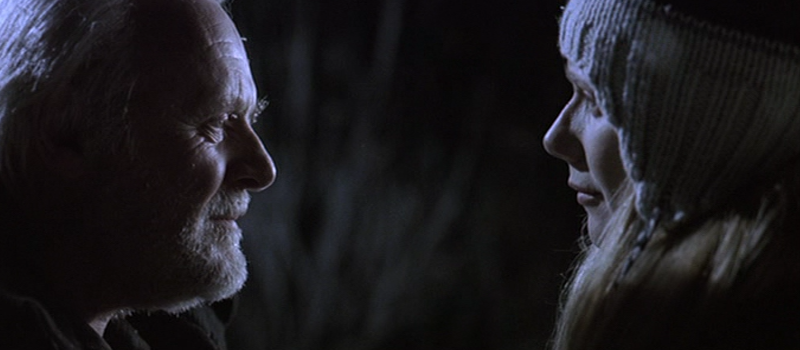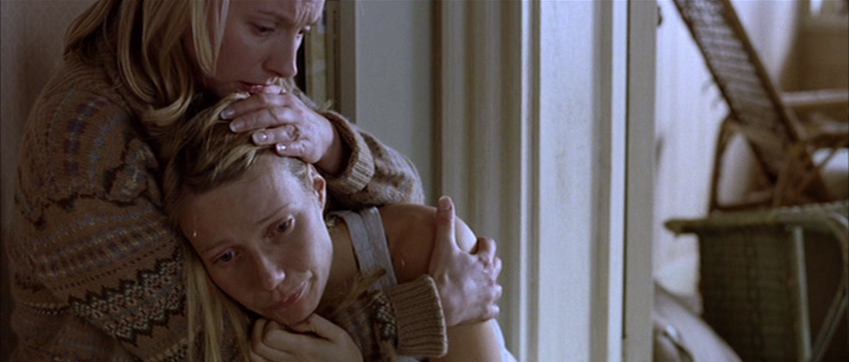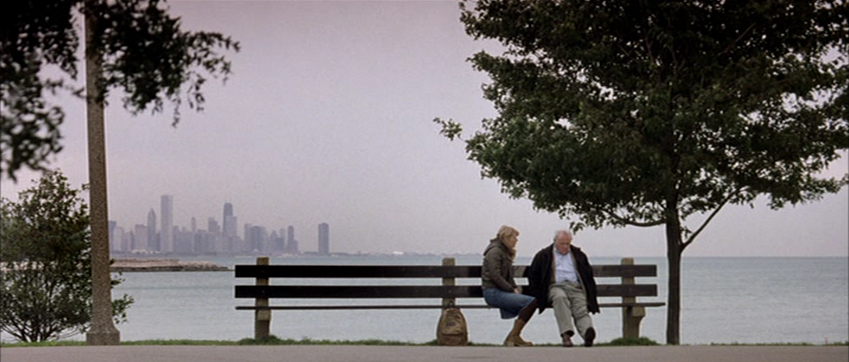

“How many days have I lost? How can I get back to the place where I started? I’m outside a house, trying to find my way in. But it is locked and the blinds are down, and I’ve lost the key, and I can’t remember what the rooms look like or where I put anything. And if I dare go inside, I wonder—will I ever be able to find my way out?”
John Madden’s chamber drama, Proof, stars Gwyneth Paltrow, Jake Gyllenhaal, and Anthony Hopkins. Based on David Auburn’s play of the same name, the film is anchored by Paltrow’s performance as Catherine Llewellyn, the daughter of Robert Llewellyn (Hopkins), a prodigy mathematician who had revolutionized the field several times over in his young adulthood, but had sadly suffered from schizophrenia. Catherine cared for her father in his last years, when he intermittently became lucid but was most frequently incoherent, thinking his meaningless scribbles to be substantial contributions to his field. In the aftermath of his death, Catherine must deal with her father’s doctoral student, Harold “Hal” Dobbs (Gyllenhaal) who wants to peruse her father’s numerous notebooks full of gibberish in hopes of uncovering something for himself to publish; and her sister, Claire (Hope Davis) who wants her sister to move to New York City with her, not so subtly hinting that she is concerned Catherine may have inherited their father’s mental instability.
Claire’s concern may not be displaced, as the film opens with Catherine engrossed in a series of infomercials, blue light from the droning television her only real companion until her father arrives to celebrate her birthday with her. The two have an interesting talk about crazy people. He posits to her that only those who are not crazy will contemplate the possibility that they may in fact be crazy; the real crazy ones have better things to do. And since she has thought about it, obviously, then, she is not really crazy. But then she asks if his theory is true, how can he contemplate being crazy, because he is actually crazy? “Well, because I’m also dead, aren’t I?” he replies.

After Hal briefly wins her affections, Catherine presents him with a mathematical proof that she wrote during her time in seclusion. But Hal and Claire immediately doubt Catherine, instead proposing that Robert had written the proof in a moment of lucidity prior to his death. Through flashbacks we are filled in with the story of how her father’s insistence that the pair collaborate compelled her to begin working on the proof; and though her father’s notes were the ramblings of a mentally absent person, his encouragement to his daughter led her to make a novel and impactful mathematical discovery. Mixed in with these formative moments is Catherine’s extended grieving of the loss of her father even while he is still alive, having forsaken her career to be his sole caretaker.
The film is graciously non-mathematical, instead using the cultural markers of academia to signal its high-brow audience members. Though the classroom is treated with reverence—three of its four main characters are all serious academics—the script takes quite a few shots at elite academic institutions. Some of the jabs are lighthearted and comedic. When Hal asks Catherine to go with him to a concert, he explains that though the band of mathematicians plays geeky songs like the completely silent “i” (in mathematics, “i” is an imaginary number), they are still mostly normal: they can dress themselves, hold down steady jobs, play sports, and some of them even wear contacts instead of glasses. But other times, the film takes a more caustic approach. At a party, she asks Hal if he knows any female mathematicians. “There’s a woman at Stanford. I don’t remember her name,” says Hal. “Sophie Germain?” asks Catherine. “Yeah. I think I’ve met her at meetings,” says Hal, to which Catherine responds that Sophie Germain was born in 1776.

Although the tragic mental lapse of Robert mirrors the arc of John Nash Jr. in A Beautiful Mind, this film is chiefly concerned with the offspring of genius. Catherine has her own cinematic touchstone in the title character of Good Will Hunting, a similarly underschooled genius that makes a significant contribution to the mathematical world. And while both films choose not to focus on the actual math in order to maintain a broad audience, Proof provides a better representation of academic life. Only a few times does it stray outside of the realistic portrayal for the sake of its audience, explaining vocally the mental leaps that real mathematicians would have taken in stride with a nod.
When the conflict reaches its culmination, and it is finally revealed to the viewer who wrote the proof, a sad and beautiful scene unfolds. “The machinery is working! All the cylinders are firing!” Robert had said. Late one night, when both simultaneously come to major conclusions in their work, Robert is adamant that Catherine go over his proof with him to help him streamline it and make it better. She tries to refuse, considering her father’s fragile and unpredictable state of mind; but when he persists, she gives in and reads what seems to be a poem about Robert’s approaching death in the guise of mathematical language. Interestingly, the poem reminded me of the haunting song “Terrible Canyons of Static” by the experimental rock band Godspeed You Black Emperor from their album Lift Your Skinny Fists Like Antennas to Heaven:
“Let X equal the quantity of all quantities of X.
Let X equal the cold.
It is cold in December.
The months of cold equal November through February.
There are four months of cold and four of heat, leaving for months of indeterminate temperature.
In February, it snows.
In March, the lake is a lake of ice.
In September, the students come back and the bookstores are full.
Let X equal the month of full bookstores.
The number of books approaches infinity as the number of months of cold approaches four.
I will never be as cold now as I will in the future.
The future of cold is infinite.
The future of heat is the future of cold.
The bookstores are infinite and so are never full except in September.”
Paltrow had acted in the London stage production of Proof (which was also directed by Madden during her time with the show), and her well-practiced performance is expressive and honest. She gets to be intelligent, contemplative, cruel, overwhelmed, aggressive, and funny, resulting in a wide-ranging display of acting capability. If there is a flaw, it is that the film doesn’t quite come around to presenting us with a character deserving of the pity and support that it asks us to give to the protagonist. She is lonely and depressed, which is pitiable enough, but her redemptive qualities are intellectual, and so there is not a suitable empathic connection for the average person. That being said, I only stumbled onto this line of thinking after viewing the film; I was fooled when I was actually watching it, and perhaps my point is too nitpicky.

A distinctive feature of the emotionally heavy film is its clever and well-timed injections of humor. Oftentimes, the lines are subtle and delivered with sincerity, meaning that the film doesn’t suddenly miss a beat if the humor doesn’t land with the audience. But it suited my tastes well. As mentioned, the film takes shots at the high-brow academic elites, but it also has a grand time ridiculing the consumerist culture for which Claire is a stand-in. When she first arrives at the house, she insists that Catherine use the new hair conditioner she bought her because it has jojoba in it.
“What is jojoba?”
“It’s something they put in for healthy hair.”
“Hair is dead.”
“What?”
“It’s dead tissue, you can’t make it healthy.”
“Whatever, it’s something that’s good for you hair.”
“Like what, a chemical?”
“No, it’s organic.”
“It can be organic and still be a chemical. Haven’t you ever heard of organic chemistry?”
In a noteworthy long take in a clothing store, Claire questions Catherine regarding the police that arrived at their house that morning while Catherine was in the shower.
“Did you tell one cop to go… have sex with the other cops mother?”
“No!”
“That’s what they said!”
“Not with that phrasing.”
The stage version of Proof takes place entirely in the backyard of Robert and Catherine’s house, with activity elsewhere only implied. The script is less mysterious, revealing early on that the proof was written by Catherine, allowing us to sympathize with her more during the harsh treatment she receives from Claire and Hal; whereas here the author is not revealed until later, and even remains slightly ambiguous as Robert seems to offer legitimate contributions to Catherine’s efforts as the two work on the proof while watching Night of the Living Dead together on the couch. But by and large, the film effectively transports the play to the screen.
Proof is a treat—well acted, thoroughly researched, and cleverly written. Its drama is simultaneously darkly humorous and emotionally resonant, and its subject matter covers parental expectations, sibling rivalry, trust, mental illness, grief, and academics. The title cleverly fills several roles—the mathematical proof central to the plot, but also proof of authorship, sincerity, and love.